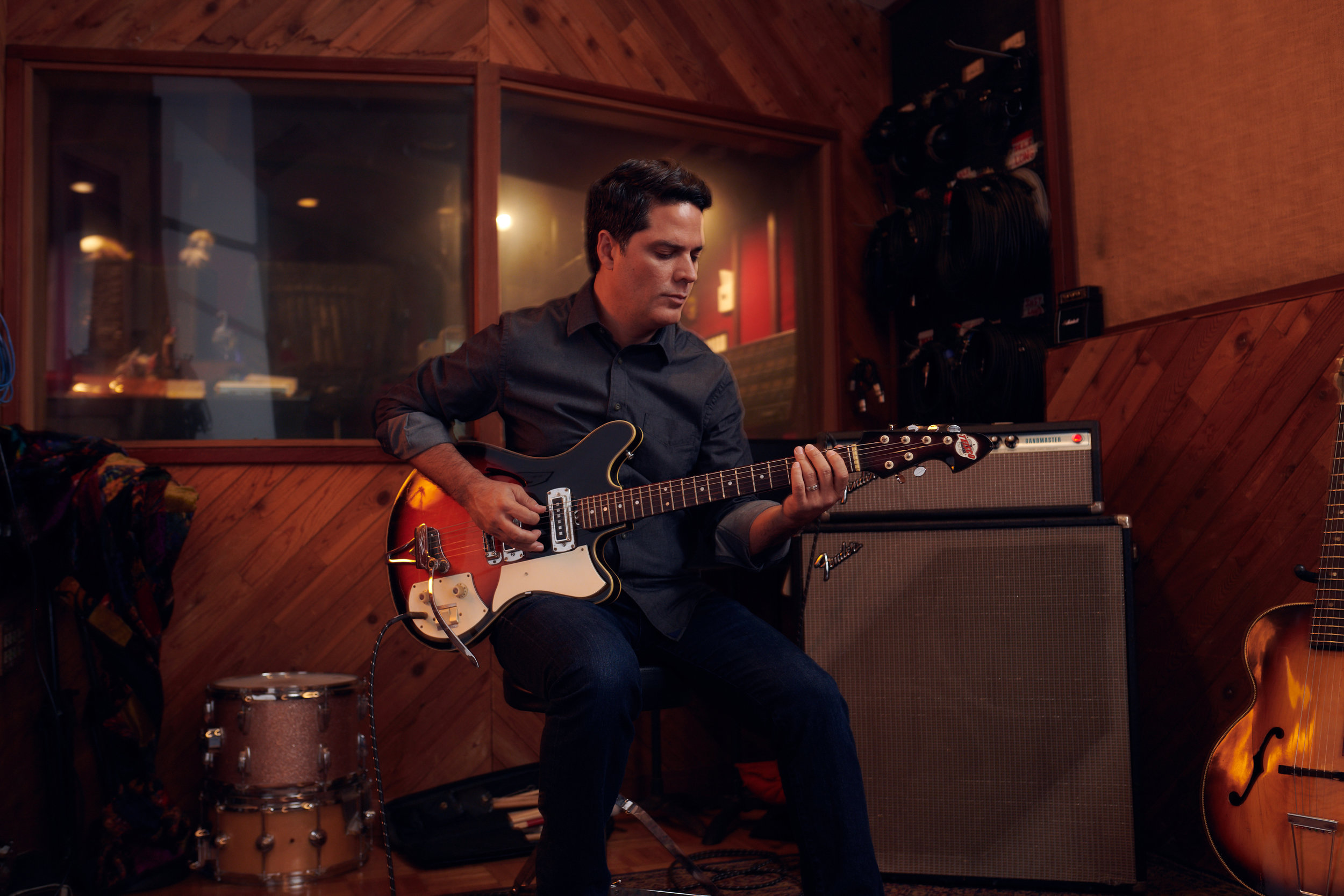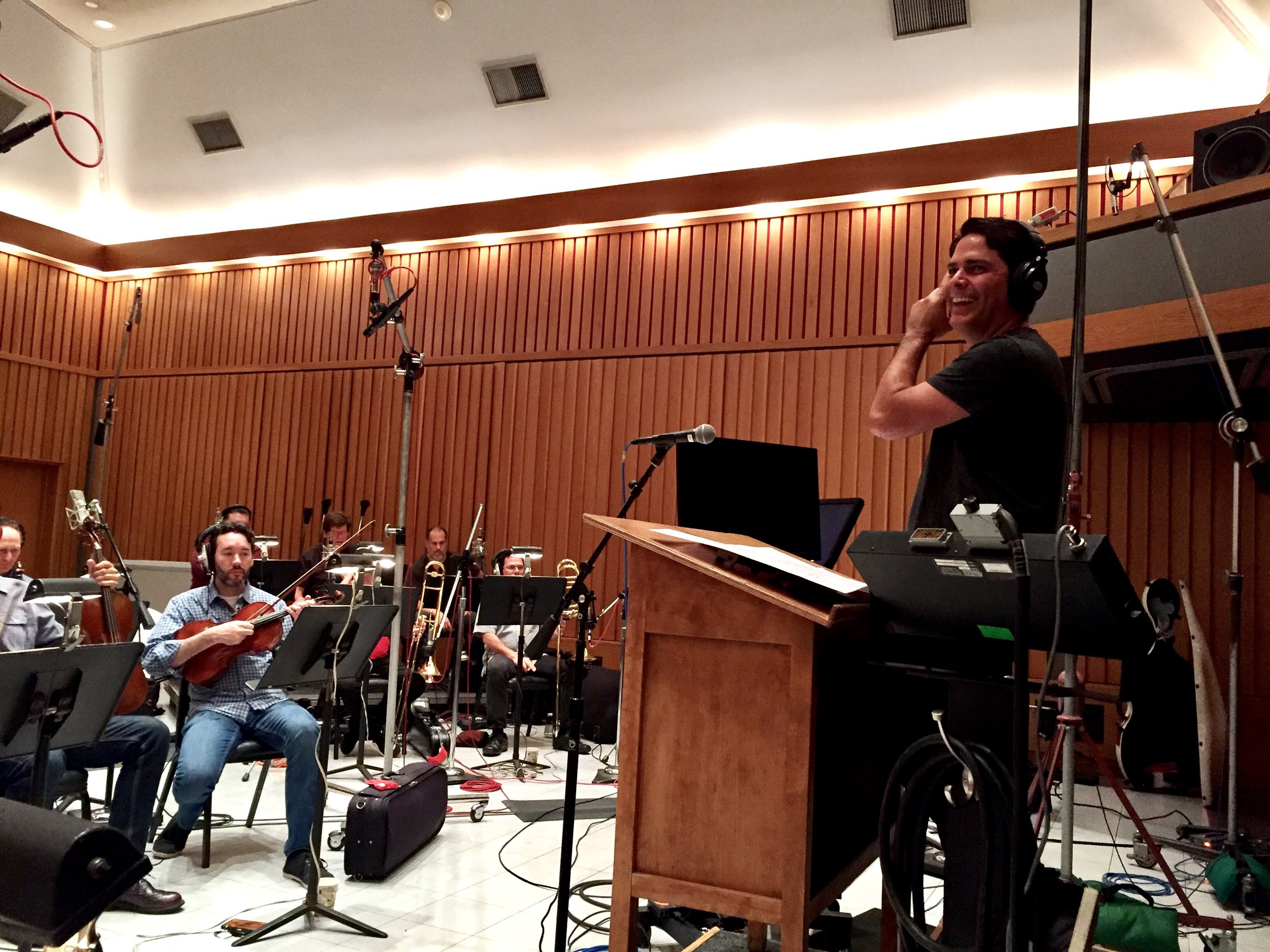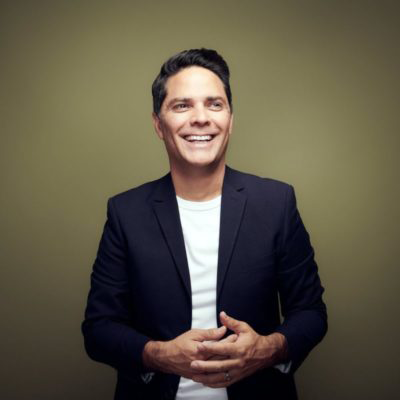September 2019 - Tony Morales
Tony Morales
Composer
Composer
EMMY®-nominated composer Tony Morales has traversed the worlds of drama, animation, and documentary for both film and television. This year has seen the release of the ESPN documentary “The Dominican Dream”, which premiered at the 2019 Tribeca Film Festival and “Wish Man”, the true story of Frank Shankwitz, who established the Make-A-Wish Foundation.
Morales is also the composer for the Disney animated series “Elena Of Avalor” for which he received two Daytime EMMY nominations and an Annie Award nomination.
Morales began his career as a composer within Hans Zimmer’s Media Ventures in 1998. As an additional music composer & arranger, he soon found himself working with and learning from some of the top film composers including Harry Gregson-Williams, John Debney and Brian Tyler, contributing to such scores as “Iron Man 3”, “Fast Five”, “Unstoppable”, “The Town”, and “The Change-Up”.
In 2012 Morales earned his first Primetime EMMY nomination for the mini-series “Hatfields & McCoys” (co-composed with John Debney). Since that time, he has gone on to compose numerous scores for film and television including the 2015 Netflix series “Bloodline” (co-composed with Edward Rogers), the hit CBS TV show “Scorpion” (co-composed with Brian Tyler), “An Actor Prepares” (directed by Steve Clark, starring Jeremy Irons) and “In Your Eyes” (written by Joss Whedon).
A guitar player since the age of six, music has always been a part of Morales’ life. After an adolescence spent playing in a series of unfortunately named bands, he retired his Flying V and turned to the world of film music.
Hello Tony, and thank you for interviewing for our LXIA membership spotlight. Can you tell us more about yourself and your path to becoming a composer?
Thank you for having me. I’m honored to be a member of LXIA. About me, I was born in La Mesa, CA, but grew up all over the United States thanks to having parents who liked to move a lot! So, from birth to 18 years old I had stints in California, Texas, Illinois, and New Hampshire. My parents aren’t musical, but they were always supportive of my interest in music. I got my first guitar when I was six years old. When I was nine and living in El Paso, my parents learned about a teenager in our neighborhood who taught guitar lessons. The timing was perfect because he only knew how to play all the rock songs I loved which kept me interested in the lessons! From then on music became really important to me, as it was the main constant in my life as I moved around so much.
By the time I was 12, I had started playing in bands and really taking music seriously. I wanted to learn more than just the rock music I had been teaching myself up to that point, so I studied privately with a classical guitar instructor and then, when I was in high school, with a private teacher who was also a professor at Berklee College of Music in Boston. That’s when I started to realistically commit to pursuing a career in music, but as a musician, not a composer. Even though I had written songs with bands, growing up I never considered myself a composer. As a student at Berklee, I discovered film music. After receiving a Bachelor’s degree from Berklee in film scoring, I moved to Los Angeles to attend University of Southern California’s (USC) Scoring For Motion Picture & Television program. After the yearlong program, I decided to stay in Los Angeles to give this career a shot. I had a day job that had nothing to do with music to support myself for three years until I eventually came across an opportunity to get my foot in the door as a freelance composer writing commercials for Hans Zimmer’s Media Ventures company.
Your work is heard in dramas, documentaries, and animations, all of which can have very distinct scoring styles. How do you handle the different scoring styles when working on multiple projects at once? Is there a difference in composing for animation versus live-action?
I plan a very organized writing schedule for myself when I’m booked on multiple projects simultaneously. I have to prioritize according to the deadlines of each production and plan accordingly. I also have to keep writing through any sort of mental blocks I encounter because the clock is always ticking and deadlines usually don’t change. It can be intense, but that pressure is what drives creativity for me. It’s not always smooth for me to move from one style to the next on a daily basis. I’ve learned that I’m more productive when I schedule my writing time in blocks for multiple projects. So, I’ll spend four to five days writing on one job then will spend the next several days on the next and so forth. Another thing that becomes a necessity when I’m multitasking is to have a great infrastructure of assistants who help me stay organized as well as freelance writers/ arrangers who I can call to chip in as needed.
There is definitely a difference in composing for animation versus live-action. In animation, and in particular with Elena Of Avalor, there are a fair amount of tonal shifts that I need to account for in the music within a scene. One scene can go from comedic to dramatic to emotional in the span of seconds. There are also a lot of musical stings or accents that I’m asked to create within the score to go along with a character’s movement while at the same time keeping a seamless flow to the music. In contrast, the creative needs in live-action aren’t nearly as driven by stings or tonal shifts. My approach to live-action is to support the narrative with music that resonates and sets the tone for the film or TV series.

When approaching your craft how is your style different from other composers you know of and what is your process to finding your musical muse?
My process changes slightly from project to project, but generally speaking I always start out by gathering as much information as I can before writing the first note. From brainstorming conversations with the director and producers to reading a script to visiting sets while in production or, in the case of animation, looking at early animation tests and character sketches. Once I’m ready to write, I plan several days of isolation in my studio and work on a variety of ideas until I run out of momentum. This is the best time to experiment when it comes to making sounds or testing simple melodic ideas.
I’ll purchase new instruments or hire musicians in an attempt to infuse a vivid musical voice to a project. I try to enrich the work with an extra level of cultural or ethnic authenticity that I know the audience won’t necessarily realize is there but that they will feel. I especially love to work with musicians early on, budget permitting. Sometimes the best ideas for me come from those experimental sessions. The project will dictate what sort of sounds I explore in the music, such as, is the score something that will utilize an orchestra? Or maybe the direction calls for music that is made with electronic synthesizers and other types of textures. It’s never the same process.
“A great way to get your foot in the door is through someone else who is already in the game. But remember that it takes time and a tremendous amount of patience. Having a great attitude and being someone that people like to be around will take you a long way.”
You’ve been playing the guitar since you were six years old; it seems that you’ve spent your entire life immersed in music. How has your style evolved over the years?
As a musician, I grew up mainly influenced by rock and blues music from my guitar heroes like Randy Rhodes and Stevie Ray Vaughn. I broadened my interests in high school to include styles of Spanish classical guitar and traditional jazz music. Once I began my studies in composition at Berklee and USC, I immersed myself in the orchestral music of composers from the classical and film music worlds such as Debussy, Ravel, Bernard Herrmann and Thomas Newman.
My first few years working as a composer were spent writing music for TV commercials. At the time it was less about who I was as a composer and more about what the client was looking for musically and whether I could write it convincingly. That was a great training ground for me to learn how to adapt as a composer and how to quickly produce music with live musicians or on my own using computers.
A few years later, when I began to compose and arrange additional music for other film & TV composers, my style evolved to more of a cinematic sound. That is what I always wanted to be writing, but I didn’t have the opportunity to do it consistently when I worked in ads. My cinematic styles have ranged from action-orchestral hybrid music to more intimate guitar-centric music to minimal ambient score. Working under composer mentors such as Harry Gregson-Williams, John Debney and Brian Tyler was a gift for me to fine-tune my skills as a dramatist and a storyteller.
In the years since, I’ve been fortunate to work on my own projects, which have called for a variety of styles. With Elena Of Avalor, it was a challenge to find the right balance of Latin flavor that could be infused with the traditional Disney orchestral sounds. On the opposite side of the spectrum was Bloodline, a series I co-scored with my college friend Edward Rogers for Netflix. That musical approach was simple in melody and heavy on textures and building tension without being overstated. We built a lot of the tension in that score through the use of electric guitar and solo violin we recorded in unconventional ways.

How was it working with Hans Zimmer’s Media Ventures and what did you learn while there that was particularly helpful throughout your career?
I had minimal experience in the real world as a composer at the time. I was brought in to Media Ventures as a junior staff composer in their commercial division. Prior to that, I had written a Blockbuster Video commercial for them as a freelancer, which then led to the offer to be on staff. It was an educational year for me, no doubt, being around and observing composers such as Hans, Harry Gregson-Williams, John Powell and others. It was overwhelming as a twenty-six year old kid, to be honest. The one thing that I still strive for to this day is something Hans taught me. He once asked me, “What is your musical voice?” I didn’t have an answer at the time, and I was confused why I didn’t. In hindsight, I had been so focused on trying to emulate my composer heroes as a writer that I neglected to be conscious of developing my own voice simultaneously. I’m forever grateful for that conversation because developing my own voice has been a career-long road, but crucial to my growth as a composer.
Congratulations on your Emmy and Annie award nominations for your work on Elena of Avalor! How did the opportunity to compose for Elena happen?
Thank you! I had been working mostly in live-action film and television before I was hired on Elena Of Avalor. A friend of mine from Berklee, who was the composer on Sofia The First for Disney Television Animation (DTVA), asked if he could forward my name to the team on Elena for consideration as the series composer. He had heard that they were looking for a composer who could specifically write for traditional orchestra as well as play guitar since that instrument was to be featured throughout the series. Of course I said yes and soon after I got a call from the head of DTVA’s music department, Jay Stutler. After going through a few rounds of meetings, they asked me to write a 3-5 minute theme suite demo since they had narrowed their search down to me and a few other candidates. I wrote a theme suite that featured the orchestra as well as the guitar and I was fortunate to be offered the job soon after. Writing for Elena has been an amazing experience and I’m so grateful to be a part of the story of Disney’s first Latina princess!
“I try to enrich the work with an extra level of cultural or ethnic authenticity that I know the audience won’t necessarily realize is there but that they will feel. I especially love to work with musicians early on, budget permitting. Sometimes the best ideas for me come from those experimental sessions.”
You’re an inspiration to Latinx entering the music production world. What advice do you have for those trying to find their footing?
Even though the overall numbers of Latinx and people of color being hired in the industry still need improving, the movement of inclusion is here and I’m hopeful the voices are becoming too loud to continue to ignore. Representation matters. I consider being of Mexican descent a plus in the industry today.
You have to really love music production to make it through the hard times that you’ll encounter. I’ve had a long journey that hasn’t been entirely filled with success. I’ve mentioned all the good here, but didn’t get into all of the rejection, missteps, self-doubt and the rest of the lessons learned. Those realities aside, I’ve found that having your craft on point, avoiding complacency, and building a strong network of collaborators are all important things you can do to gain your footing in this business. I’d also advise anyone to seek out those composers or music makers you admire and offer to assist or help them on a project if you can. A great way to get your foot in the door is through someone else who is already in the game. But remember that it takes time and a tremendous amount of patience. Having a great attitude and being someone that people like to be around will take you a long way.
What is next for you Tony? And what do you do when you are not composing musical scores?
I’m currently in the middle of working on season 3 of Elena of Avalor. Later this year I’ll begin work on two projects for Quibi, the mobile-centric, short-form streaming-video platform founded by Jeffery Katzenberg, set to launch next Spring.
I’ve also recently had opportunities to pay it forward, which has personally been very rewarding. This Summer I was invited to be a composer advisor at the 2019 Sundance Institute Film Music and Sound Design Lab, which took place at Skywalker Ranch in Marin County. This coming year I’ll be part of the Uni Music Mentors program at University High School in West LA.
My wife and I have two daughters, ages 13 and 10, so being with them is where you’ll find me when I’m not composing! I’m also a huge fan of basketball both as a spectator and a weekend warrior. Otherwise, simply making the time to be with family and friends is how I stay balanced.
Thank you for interviewing with us,Tony!
Follow Tony Morales on social media!

